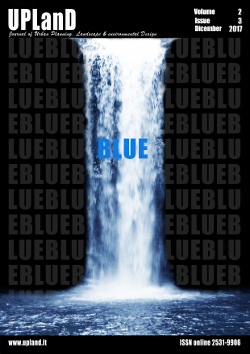Adaptive cities. Incremental processes for a contemporary urban and territorial regeneration strategy
Main Article Content
Abstract
Today, the intensive territory and resources consumption, the subversion of the ecological conditions of the planet, and the damage caused by climate change, have led to an imbalance and a decline in the sustainable model. So, the water and the system of its superficial and deep networks have become the main risk factor due to less and less casual or extraordinary events, as well as a pollution vehicle resulting from poor disposal of urban and industrial wastewater.
What emerges in the urban and territorial analysis is not only a critical condition in which it is necessary to rethink the functioning of the city structure, but above all the need to trigger new “recycling” mechanisms (Bocchi, 2016) and new “resilient” strategies which presuppose the recognition of the potential regenerative value of drosscapes (Berger, 2006) as a new renewable and sustainable resource for the contemporary city project.
This contribution aims to provide a moment of reflection, also through some project explorations, on how the rethinking of environmental infrastructures can play a key and structuring role in urban regeneration practices and more comprehensively can be the occasion for a process of re-urbanization of the contemporary city, precisely because of their ability to intercept also fast and slow mobility networks, energy and digital networks, a multitude of marginal spaces and degraded artifacts.Downloads
Article Details

This work is licensed under a Creative Commons Attribution-NonCommercial-NoDerivatives 4.0 International License.
Authors who publish with this journal agree to the following terms:- Authors retain copyright and grant the journal right of first publication with the work simultaneously licensed under a Creative Commons Attribution License that allows others to share the work with an acknowledgement of the work's authorship and initial publication in this journal.
- Authors are able to enter into separate, additional contractual arrangements for the non-exclusive distribution of the journal's published version of the work (e.g., post it to an institutional repository or publish it in a book), with an acknowledgement of its initial publication in this journal.
- Authors are permitted and encouraged to post their work online (e.g., in institutional repositories or on their website) prior to and during the submission process, as it can lead to productive exchanges, as well as earlier and greater citation of published work (See The Effect of Open Access).
References
Autorità di Bacino Campania Centrale from http://www.adbcampaniacentrale2.it/
Barcelona City Protocol from https:// www.youtube.com/ watch?v=oivMuQGZf30
Bèlanger, P. (2011), Landscape infrastructure: urbanism beyond engineering, in S. N. Pollalis, A. Georgoulias, S. J. Ramos & D. Shodek, Infrastructure sustainability and design, New York, USA: Routledge
Berger, A. (2006), Drosscape, Wasting land in urban America, New York, USA: Princeton Architectural Press
Bulkeley, H. (2013), Cities and Climate Change, Routledge Critical Introductions to Urbanism and the City, New York, USA: Routledge
Corner, J. (1999), Recovering Landscape. Essays in Contemporary Landscape Theory, New York, USA: Princeton Architectural Press.
Corbellini G., Marini S. (2016) (eds.), Recycled Theory: Illustrated Dictionary, Macerata, IT: Quodlibet
Corner, J. (1999), Recovering Landscape. Essays in Contemporary Landscape Theory, New York, USA: Princeton Architectural Press
Detroit Strategic Framework Plan from http://detroitfuturecity.com
EC European Communities (2009), Adaptation Programme for Spatial Planning and Climate, in White Paper. Adapting to climate change: Towards a European framework for action, from http://ec.europa.eu/health/ph_threats/climate/docs/com_2009_147_en.pdf
Franco A. (2012) (eds.), Studi Storici Sarnesi, Benevento, IT: Il Chiostro.
Gasparrini, C. (2011), Città da riconoscere e reti eco-paesaggistiche, in PPC, n. 25, Trento-Barcellona, IT: ListLab.
Gasparrini C. (2014), Multiscalar and multiscapes visions to tell Naples, in Gausa M. Ricci M., Med.net.rep.01, Trento-Barcellona, It: ListLab.
Gasparrini C. (2015), Politiche e progetti urbani di fronte alle domande ambientali della città diffusa, in F. D. Moccia, M. Sepe (eds.), Una politica per le città italiane, Roma. IT: Inu Edizioni
Gasparrini C., Terracciano A. (2016) (eds.), DROSSCITY. Metabolismo urbano, resilienza e progetto di riciclo dei drosscape, Trento-Barcellona, IT: ListLab.
Gasparrini C. (2017), R[esilient]O[smotic]M[etabolic]E[cological] 20-25 perspective, in Gasparrini C., Terracciano A. (eds.), ROME 20-25 Resilient Osmotic Metabolic Ecological, Trento-Barcellona, IT: ListLab.
Gasparrini C., Terracciano A. (2017) (eds), ROME 20-25 Resilient Osmotic Metabolic Ecological, Trento-Barcellona, IT: ListLab.
L. Fabian, P. Viganò (2010) (eds.), Extreme City. Climate change and the transformation of the waterscape, Venezia, IT: Iuav Edizioni.
Pippo Ciorra, Francesco Garofalo e Piero Ostilio Rossi (2015) (eds.), ROMA 20-25 Nuovi cicli di vita della metropoli, Macerata, It: Quodlibet.
Rotterdam Climate Change Adaptation Strategy from
http://www.rotterdamclimateinitiative.nl/documents/2015-en-uder/Documenten/20121210_RAS_EN_lr_versie_4.pdf
Terracciano A. (2016). Scritture implicite. Traiettorie possibili tra forme spaziali e nuove densità relazionali, in G. Punziano (Eds.), Società, economia e spazio a napoli. Esplorazioni e riflessioni (pp. 17-35). L’Aquila, IT: GSSI Working Paper Series|28.
Terracciano A. (2014). Geografie dello scarto vs geografie del riciclo. Disegni di una traiettoria possibile, in Pavia R., Secchi R., Gasparrini C. (Eds.), Il territorio degli scarti e dei rifiuti (pp.146-153), Roma, IT: Aracne
Secchi B. (1986), Progetto di Suolo, in Casabella, n. 520/521.
Secchi, B. (2009a). A new urban question: when, why and how some fundamental metaphors wew used, 19 International Metaphors in/on Architecture and Urbanism Conference Proceedings, Paris, Ecole Special d’Arquitectura e Centre de l’Histoire de l’Art Allemand, November 26-28, 2009.
Secchi, B. (2009b). The New Urban Question - Urbanism beyond Neo-Liberalism. 4th International Conference of the International Forum on Urbanism (IFoU) Proceedings, Amsterdam/Delft, November 26-28, 2009.
Shannon, K. De Meulder, B. (2013), Water urbanisms east, Zurich, CH: Park Books
Secchi, B. (2013), La nuova questione urbana, in Fabian L. (eds), New urban question. Ricerche sulla città contemporanea 2009-2014, Roma, IT: Aracne
Viganò, P. (2013). L’urbanistica come strumento di ricerca , in L. Fabian (Ed.). New urban question. Ricerche sulla città contemporanea 2009-2014 , pp. 78-99, Roma, IT: Aracne
Watson, D., & Adams, M. (2010) Flooding, in Design for Flooding: Architecture, Landscape, and Urban Design for Resilience to Flooding and Climate Change, , Hoboken, USA: John Wiley & Sons, Inc.
Wolman A. (1965). The metabolism of cities, Scientific American, n. 213, pp. 179-190

